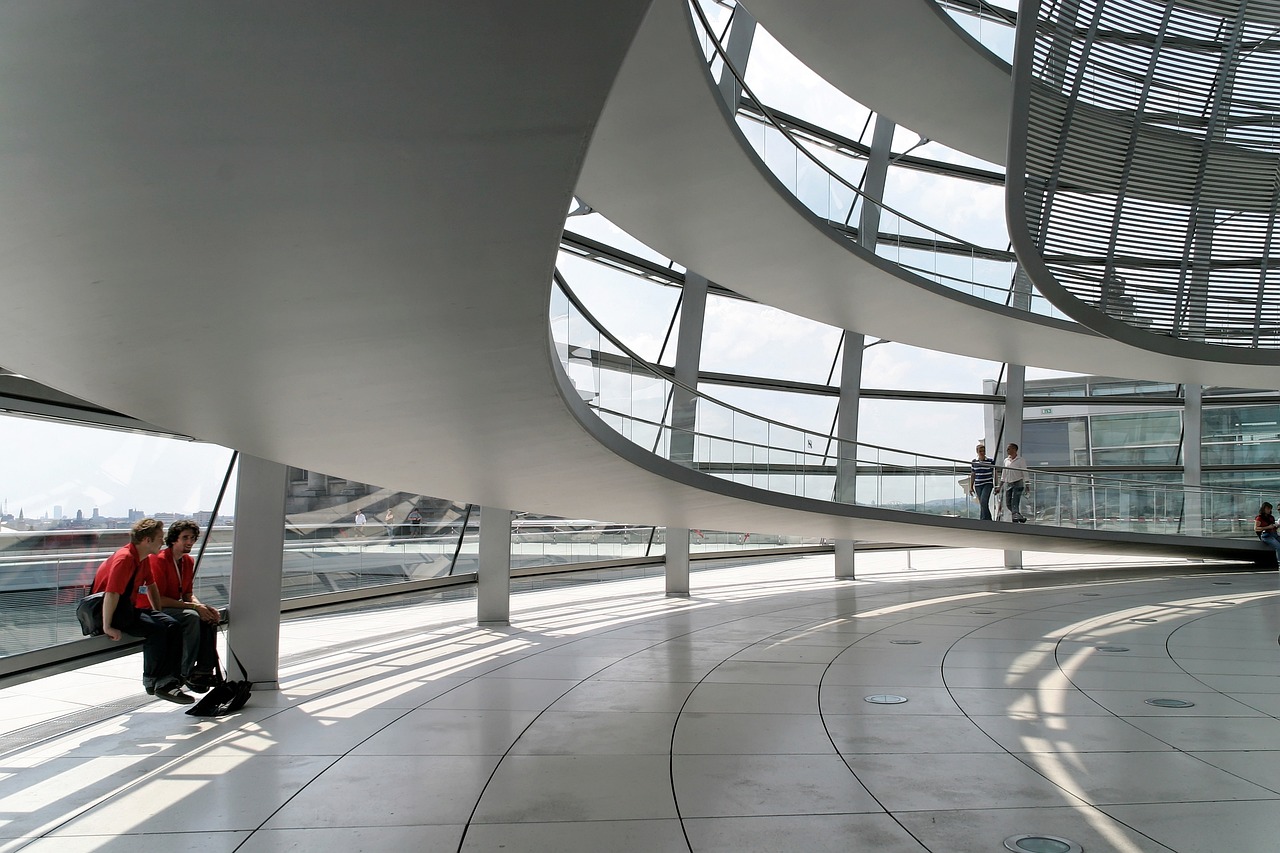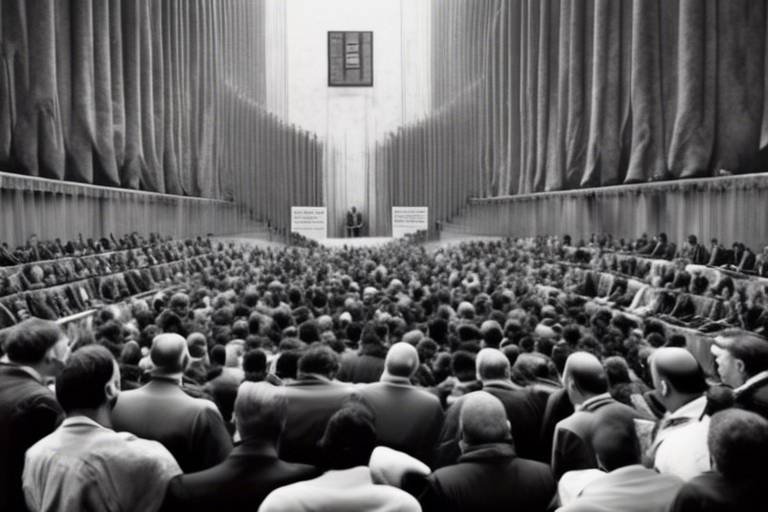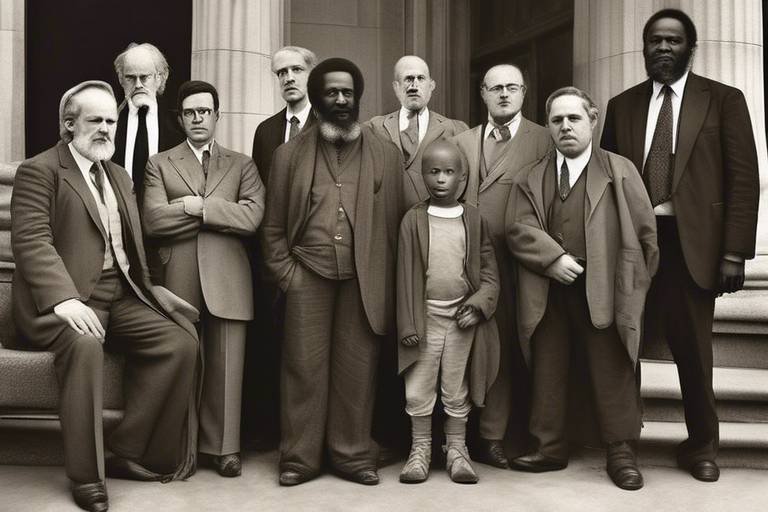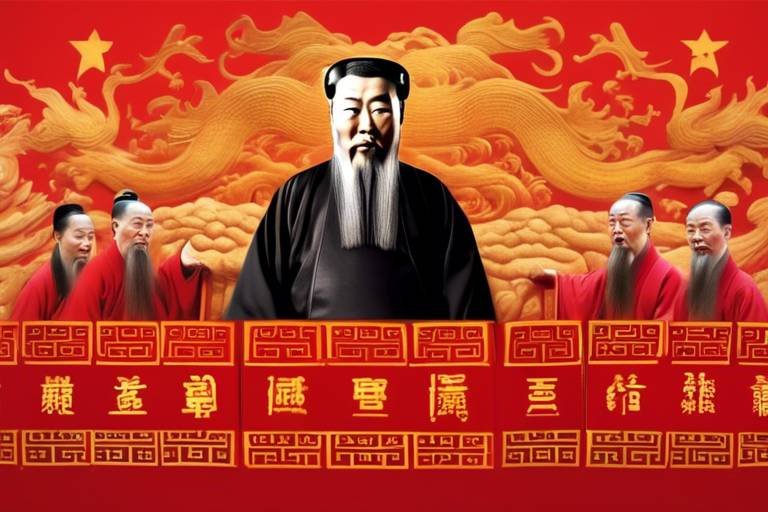Is Political Philosophy Still Relevant in the 21st Century?
In an age dominated by rapid technological advancements and complex global issues, one might wonder: is political philosophy still relevant? The answer is a resounding yes! Political philosophy, the study of fundamental questions about governance, justice, and the role of individuals within society, remains a cornerstone of our understanding of the world. It acts as a lens through which we can examine the evolving nature of power, authority, and ethics in our contemporary landscape. As we navigate through the challenges of the 21st century—whether it be climate change, systemic inequality, or the rise of populism—political philosophy provides us with the tools to dissect these issues critically and thoughtfully.
Consider this: just as a compass guides a traveler through uncharted territory, political philosophy helps us chart our course through the complexities of modern governance. It encourages us to ask tough questions about the social contract, our responsibilities to one another, and the moral implications of our political choices. By engaging with the ideas of past philosophers and applying them to current dilemmas, we can develop a deeper understanding of our societal values and the principles that underpin them.
Moreover, the relevance of political philosophy extends beyond academic circles; it permeates everyday life. From discussions at the dinner table to debates on social media, the principles of political thought shape our opinions and influence our actions. Whether we realize it or not, we are constantly engaging with concepts of justice, rights, and governance. This engagement is crucial, as it fosters a culture of informed citizenship and active participation in democratic processes.
As we delve deeper into the implications of political philosophy, it becomes evident that its teachings are not just theoretical musings but practical frameworks that can guide our responses to pressing global issues. For instance, the exploration of ethical governance can illuminate the path toward more equitable policies, while discussions on individual rights can empower marginalized communities. In this way, political philosophy is not only relevant but essential for navigating the challenges of our time.
- What is political philosophy? Political philosophy is the study of fundamental questions regarding governance, justice, rights, and the role of individuals in society.
- Why is political philosophy important today? It provides critical insights into contemporary issues such as inequality, climate change, and governance, helping us navigate complex societal challenges.
- How can political philosophy influence everyday life? It shapes our opinions and actions regarding civic responsibility, rights, and ethical governance, fostering informed citizenship.
- Are there modern applications of classical political theories? Yes, many modern political ideologies and policies are rooted in classical theories, adapting them to address contemporary issues.

The Evolution of Political Philosophy
Political philosophy is like a living organism, constantly evolving and adapting to the changing landscapes of society. From the ancient musings of philosophers like Plato and Aristotle to the complex theories of modern thinkers, the journey of political philosophy is rich and multifaceted. It has undergone significant transformations over the centuries, responding to the pressing questions of justice, power, and governance that have always occupied human thought. As societies progress, so too does the discourse around how we govern ourselves and the ethical implications of those governance structures.
In its earliest forms, political philosophy was often intertwined with metaphysics and ethics. Classical philosophers sought to define the ideal state and the virtues necessary for its leaders. For instance, Plato's vision of a philosopher-king was based on the belief that only those with deep understanding of justice and virtue could lead effectively. Aristotle, on the other hand, emphasized the importance of empirical observation and practical governance, arguing that the best political systems are those that promote the common good.
As we moved into the Enlightenment era, political philosophy began to shift towards individual rights and the social contract. Thinkers like John Locke and Jean-Jacques Rousseau introduced ideas that emphasized personal freedom and the inherent rights of individuals. These concepts laid the groundwork for modern democratic thought and continue to influence contemporary debates about human rights and governance. The evolution didn't stop there; the Industrial Revolution brought about new challenges, prompting philosophers like Karl Marx to critique capitalism and propose alternative systems that prioritize collective ownership and equality.
Today, political philosophy grapples with the complexities of a globalized world. Issues such as climate change, migration, and digital governance require a reevaluation of traditional theories. The rise of postmodern critiques has also added layers of complexity, challenging the very foundations of political thought by questioning the universality of truths and the power dynamics at play. This evolution is not merely academic; it has real implications for how we understand authority, justice, and the role of the individual within society.
To illustrate this evolution, consider the following table that outlines key eras and their defining characteristics:
| Era | Key Thinkers | Defining Characteristics |
|---|---|---|
| Classical | Plato, Aristotle | Focus on ideal governance and ethics |
| Enlightenment | Locke, Rousseau | Emphasis on individual rights and social contracts |
| Modern | Marx, Mill | Critique of capitalism and exploration of utilitarianism |
| Postmodern | Foucault, Derrida | Questioning of universal truths and power dynamics |
In conclusion, the evolution of political philosophy is a testament to humanity's ongoing quest for understanding and improvement. As we face new challenges, the insights gained from historical thinkers remain invaluable. They provide a framework for analyzing contemporary issues and inspire us to seek innovative solutions that reflect our evolving values and societal norms.

Key Thinkers and Their Impact
When we think about political philosophy, it's impossible to ignore the profound influence of key thinkers who have shaped our understanding of governance, justice, and power dynamics. These intellectual giants have left an indelible mark on political thought, providing frameworks that continue to resonate in today’s societal discussions. Their ideas are not just relics of the past; they are living concepts that inform contemporary political discourse.
Take, for instance, Plato, whose vision of an ideal state in "The Republic" challenges us to consider the nature of justice and the role of the philosopher-king. Plato's belief that the best rulers are those who understand the essence of justice is a concept that still sparks debate. Are leaders today equipped with the philosophical insight necessary to govern wisely? This question invites us to reflect on the qualifications of our modern-day leaders and the ethical implications of their decisions.
Then there’s Aristotle, who shifted the focus from idealism to realism. His analysis of different government forms in "Politics" provides a practical lens through which we can examine our own systems. Aristotle’s idea that the purpose of the state is to promote the good life for its citizens remains a poignant reminder of the responsibilities of government. In a world grappling with inequality and injustice, Aristotle’s insights compel us to ask: Is our government truly serving the common good?
Fast forward to the Enlightenment, and we encounter thinkers like John Locke and Jean-Jacques Rousseau. Locke’s theories on natural rights and the social contract laid the groundwork for modern democracy. His assertion that government derives its authority from the consent of the governed is a principle that underpins many democratic societies today. Rousseau, on the other hand, emphasized the importance of collective will and the idea that true freedom comes from participation in the political process. His thoughts provoke critical questions about civic engagement and the role of the individual in shaping society.
In the 19th century, the emergence of Marxism introduced a radical critique of capitalism and class struggle. Karl Marx and Friedrich Engels argued that societal change is driven by economic forces and class conflict. Their ideas challenge us to consider the implications of economic inequality in our current political landscape. Are we witnessing a modern-day class struggle, and how do we address the disparities that exist within our societies?
Moreover, the contributions of John Stuart Mill cannot be overlooked. His advocacy for individual liberty and utilitarianism has had a lasting impact on liberal thought. Mill's belief that the protection of individual rights is essential for a flourishing society raises important discussions about freedom of expression and the limits of governmental power. In an age of increasing censorship and political correctness, Mill’s ideas push us to defend our rights to free speech while balancing societal norms.
As we analyze the contributions of these thinkers, it becomes evident that their ideas are not just historical footnotes; they are essential for understanding the complexities of modern governance. The political landscape is rife with challenges that echo the concerns raised by these philosophers. Whether it's debates over social justice, economic disparity, or individual rights, the foundational questions posed by these thinkers remain relevant.
In summary, the impact of key political philosophers on contemporary thought is profound. Their inquiries into justice, power, and governance continue to shape our understanding of political systems and societal values. As we navigate the complexities of the 21st century, engaging with their ideas can provide valuable insights into the pressing issues of our time.
- Why is political philosophy important today? Political philosophy provides the frameworks to understand and critique our political systems, guiding us in addressing contemporary issues such as inequality and governance.
- How do classical philosophers influence modern political thought? Classical philosophers like Plato and Aristotle laid the groundwork for concepts of justice and governance that continue to inform current political debates.
- What role do modern philosophers play in shaping political ideologies? Modern philosophers challenge existing ideologies and introduce new perspectives, prompting critical discussions about rights, freedoms, and societal obligations.

Classical Philosophers
When we think about the roots of political philosophy, the names Plato and Aristotle inevitably come to mind. These classical philosophers laid the groundwork for many of the ideas that still influence our political systems today. Plato, in his work "The Republic," envisioned a society governed by philosopher-kings, individuals who would rule not for personal gain but for the common good. This notion raises a compelling question: can we trust our leaders to prioritize the welfare of the people? Plato believed that only those who truly understood justice and virtue should hold power, a concept that echoes in contemporary discussions about political integrity and the qualifications of our leaders.
On the other hand, Aristotle took a more pragmatic approach. He believed that governance should reflect the realities of human nature and society. In his work "Politics," he categorized different forms of government—monarchy, aristocracy, and polity—while also warning against their corrupt counterparts: tyranny, oligarchy, and democracy. His insights prompt us to reflect on our own political structures and consider whether they serve the interests of the many or the few. Aristotle's emphasis on the "golden mean," or the idea of balance and moderation, remains a guiding principle in political discourse, urging us to seek equilibrium in our policies and practices.
Both philosophers grappled with the concept of justice, a theme that is timeless and universal. To them, justice was not merely a legalistic framework but a moral imperative that underpins a functioning society. As we navigate modern issues like inequality and social justice, their teachings serve as a reminder that the quest for a just society is ongoing. The foundational ideas of these classical thinkers invite us to question the status quo and challenge the moral fabric of our political institutions.
Additionally, the dialogues initiated by these philosophers continue to inspire contemporary political theory. For instance, the tension between individual rights and the common good, a recurring theme in political debates, can be traced back to their discussions. Are we, as individuals, entitled to pursue our interests at the expense of societal welfare? Or should we prioritize community needs over personal desires? These questions are as relevant now as they were in ancient Greece, demonstrating that the wisdom of classical philosophers is not just a relic of the past but a vital part of our political discourse today.
In conclusion, the teachings of Plato and Aristotle provide a rich tapestry of ideas that continue to resonate in our current political landscape. Their exploration of governance, ethics, and justice offers valuable insights into the complexities of human society. As we confront the challenges of the 21st century, revisiting their works can equip us with the philosophical tools necessary to navigate the turbulent waters of modern politics.
- Why are classical philosophers important in modern political philosophy?
Classical philosophers like Plato and Aristotle provide foundational concepts that continue to shape our understanding of governance, ethics, and justice. - How do Plato's and Aristotle's ideas differ?
Plato emphasized the role of philosopher-kings and ideal forms of governance, while Aristotle focused on practical governance reflecting human nature and societal realities. - Can the teachings of classical philosophers address contemporary issues?
Yes, their ideas about justice, individual rights, and the common good are highly relevant in discussions about modern political challenges.

Modern Philosophical Movements
Modern philosophical movements have shaped the political landscape dramatically over the last few centuries. Among the most influential are liberalism and socialism, each offering distinct perspectives on governance, individual rights, and the role of the state. These movements emerged as responses to the changing socio-economic conditions and the need for new frameworks to address the complexities of modern life.
Liberalism, often seen as a champion of individual freedoms, advocates for a limited government that protects personal liberties and promotes free markets. It traces its roots back to Enlightenment thinkers like John Locke and John Stuart Mill, who argued for the inherent rights of individuals and the social contract's importance. In contemporary society, liberalism manifests in various forms, including classical liberalism, which emphasizes minimal state intervention, and social liberalism, which supports more active government roles in ensuring social justice and equality.
On the other hand, socialism arose as a critique of capitalism, seeking to address the inequalities and injustices it often perpetuates. Socialists argue for collective ownership and democratic control over the means of production, aiming to create a more equitable society. The philosophical underpinnings of socialism can be traced back to figures like Karl Marx and Friedrich Engels, whose writings highlighted the struggles of the working class and the need for systemic change. Today, various strands of socialism exist, from democratic socialism, which seeks reform through electoral processes, to more radical forms advocating for revolutionary change.
Both of these movements have evolved significantly since their inception. For instance, contemporary liberalism often grapples with issues like globalization and environmental sustainability. How do we balance individual freedoms with the collective responsibility to protect our planet? Similarly, socialism has adapted to modern challenges, incorporating ideas about intersectionality and environmental justice, recognizing that social struggles are interconnected.
Moreover, the emergence of postmodern critiques has added another layer of complexity to these movements. Postmodernism challenges the grand narratives of both liberalism and socialism, emphasizing the importance of context, power dynamics, and the subjective nature of political truths. This perspective encourages a more nuanced understanding of political ideologies, recognizing that there is no one-size-fits-all solution to the issues we face today.
In summary, modern philosophical movements like liberalism and socialism continue to influence political thought and action in the 21st century. They evolve in response to new challenges, adapting their core principles to remain relevant in our rapidly changing world. As we navigate complex issues like inequality, climate change, and global governance, engaging with these philosophical frameworks can provide valuable insights and guide our collective efforts toward a more just and equitable society.
- What is the main difference between liberalism and socialism? Liberalism focuses on individual rights and limited government, while socialism emphasizes collective ownership and equality.
- How do modern philosophical movements address contemporary issues? They adapt their principles to tackle challenges like globalization, inequality, and environmental concerns, providing frameworks for understanding and action.
- What role does postmodernism play in political philosophy? Postmodernism critiques traditional narratives, highlighting the importance of context and power dynamics, thus enriching contemporary political discourse.

Postmodern Critiques
The landscape of political philosophy has undergone a seismic shift with the advent of postmodern critiques. Unlike their predecessors, who sought universal truths and absolute principles, postmodern thinkers challenge the very foundations upon which traditional political philosophies stand. They argue that our understanding of politics is not just shaped by grand narratives but is also deeply influenced by context, power dynamics, and individual perspectives. This perspective is akin to viewing a painting from different angles; each viewpoint reveals a unique interpretation, highlighting the subjective nature of political truths.
At the heart of postmodern critiques is the idea that power is dispersed throughout society rather than concentrated in a single institution or individual. Thinkers like Michel Foucault have been instrumental in this shift, suggesting that power operates through various social structures and discourses. This means that political philosophy must adapt to consider how knowledge, language, and cultural norms shape our understanding of governance and authority. For instance, Foucault's concept of "biopower" illustrates how modern states regulate populations through a myriad of subtle mechanisms rather than overt coercion.
Moreover, postmodernism emphasizes the importance of context in political discourse. It argues that political truths are not absolute but are contingent upon historical, cultural, and social circumstances. This leads to a more pluralistic approach to political philosophy, where multiple voices and narratives are acknowledged. This is particularly relevant in today's globalized world, where diverse cultures and ideologies collide, creating a rich tapestry of political thought. For example, the rise of identity politics can be seen as a postmodern response to the inadequacies of traditional political frameworks that often overlook marginalized voices.
In practical terms, this critique encourages us to question the legitimacy of established political norms and practices. It pushes us to ask critical questions such as:
- Whose voices are being heard in political debates?
- What narratives are being prioritized, and which are being silenced?
- How do our cultural backgrounds influence our understanding of justice and governance?
By engaging with these questions, we can better understand the complexities of contemporary political issues. Postmodern critiques serve as a reminder that political philosophy is not a static field; it is a dynamic and evolving discipline that must continuously adapt to the changing realities of society. In doing so, it not only enriches our understanding of political phenomena but also fosters a more inclusive and equitable political landscape.
As we navigate the complexities of the 21st century, the insights offered by postmodern critiques become increasingly relevant. They challenge us to rethink our assumptions about power, governance, and justice, urging us to consider the myriad of factors that shape our political realities. In this way, political philosophy remains a vital tool for understanding and addressing the pressing challenges of our time.
- What is postmodernism in political philosophy? Postmodernism is a critical approach that questions the existence of universal truths and emphasizes the role of context and power dynamics in shaping political thought.
- Who are some key postmodern thinkers? Notable postmodern thinkers include Michel Foucault, Jacques Derrida, and Jean-François Lyotard, each contributing unique perspectives on power, language, and knowledge.
- How does postmodernism affect contemporary politics? Postmodernism influences contemporary politics by promoting pluralism, encouraging the inclusion of diverse voices, and challenging established norms and narratives.
- Why is it important to study postmodern critiques? Studying postmodern critiques is essential for understanding the complexities of modern political issues and fostering a more inclusive political discourse.

Contemporary Issues in Political Philosophy
In the ever-evolving landscape of the 21st century, contemporary issues in political philosophy have taken center stage, challenging traditional frameworks and inviting fresh perspectives. Today, we grapple with a myriad of pressing concerns that demand philosophical scrutiny, such as globalization, inequality, and environmental degradation. Each of these issues not only shapes our political discourse but also influences the very fabric of our societies, prompting us to rethink our values and priorities.
Globalization, for instance, has transformed the way we perceive borders and sovereignty. In a world where information, goods, and people move across nations with unprecedented ease, the question arises: what does it mean to be a citizen in a globalized society? Political philosophers argue that traditional notions of citizenship and national identity are being challenged, leading to a re-evaluation of our responsibilities not just to our fellow citizens, but to humanity as a whole. This shift compels us to consider the ethical implications of our actions, as decisions made in one part of the world can have far-reaching effects elsewhere.
Inequality, another critical issue, continues to be a hotbed of discussion among political philosophers. The gap between the rich and the poor is widening, leading to questions about justice and fairness in our economic systems. How do we define a just society? Is it merely one that provides equal opportunities, or does it require a more radical redistribution of wealth? Philosophers like John Rawls have laid the groundwork for understanding justice through the lens of fairness, but contemporary thinkers are pushing these ideas further, arguing for systemic changes that address the root causes of inequality. This discourse is crucial as it informs policies aimed at creating a more equitable society.
Environmental concerns are perhaps the most urgent issue of our time, forcing political philosophy to confront the relationship between humanity and nature. As climate change accelerates and natural disasters become more frequent, the ethical implications of our environmental policies come into sharp focus. Questions about our responsibility to future generations, the rights of non-human entities, and the sustainability of our economic practices are at the forefront of this debate. Political philosophers are increasingly advocating for a deep ecological approach, which emphasizes the intrinsic value of nature and argues for a fundamental shift in how we view our place within the ecosystem.
To illustrate the intersection of these contemporary issues with political philosophy, consider the following table that summarizes how each issue prompts philosophical inquiry:
| Contemporary Issue | Philosophical Inquiry | Implications for Society |
|---|---|---|
| Globalization | What is the role of citizenship in a globalized world? | Redefining responsibilities beyond national borders. |
| Inequality | How do we achieve justice and fairness in economic systems? | Policies aimed at wealth redistribution and social equity. |
| Environmental Concerns | What are our ethical responsibilities to future generations? | Shift towards sustainable practices and environmental justice. |
Ultimately, the relevance of political philosophy in addressing these contemporary issues cannot be overstated. It serves as a vital lens through which we can examine the ethical dimensions of our political decisions and societal structures. As we navigate the complexities of modern life, the insights gleaned from political philosophy can guide us in making informed choices that not only reflect our values but also enhance the common good.
Q1: Why is political philosophy important in today's society?
A1: Political philosophy helps us understand the ethical implications of our political decisions and societal structures, guiding us in creating a more just and equitable world.
Q2: How does globalization affect political philosophy?
A2: Globalization challenges traditional notions of citizenship and national identity, prompting philosophical inquiries about our responsibilities to humanity as a whole.
Q3: What role does political philosophy play in addressing inequality?
A3: Political philosophy provides frameworks for understanding justice and fairness, informing policies aimed at reducing the wealth gap and promoting social equity.
Q4: How can political philosophy contribute to environmental issues?
A4: Political philosophy encourages a reevaluation of our relationship with nature, advocating for sustainable practices and ethical responsibilities towards future generations.

The Role of Political Philosophy in Education
The importance of political philosophy in education cannot be overstated. It serves as a foundational pillar that fosters critical thinking, cultivates civic engagement, and nurtures informed citizenship among students. In a world where political landscapes are constantly shifting, understanding the principles of governance, justice, and ethics is essential. By integrating political philosophy into the curriculum, educators can empower students to navigate the complexities of modern society with a well-rounded perspective.
One of the key aspects of teaching political philosophy is its ability to encourage students to question the status quo. This critical inquiry is vital in a democratic society, where the ability to challenge existing norms and advocate for change is crucial. When students engage with philosophical texts and debates, they learn to analyze arguments, recognize biases, and develop their own viewpoints. This process not only enhances their analytical skills but also instills a sense of responsibility towards their community and the world at large.
Moreover, political philosophy equips students with the tools to understand and appreciate their rights and responsibilities as citizens. By exploring concepts such as justice, freedom, and equality, students can grasp the significance of active participation in democratic processes. They learn that democracy is not merely a system of government but a way of life that requires engagement, advocacy, and a commitment to the common good. This understanding is particularly important in today’s context, where apathy and disengagement can lead to a decline in democratic values.
Incorporating political philosophy into education also promotes interdisciplinary learning. For instance, when students study political theory alongside sociology or economics, they gain a more nuanced understanding of how various factors influence political systems and societal outcomes. This interdisciplinary approach enriches their education, allowing them to connect theoretical concepts with real-world issues. As a result, students become better equipped to tackle complex challenges, such as globalization, inequality, and environmental crises.
To illustrate the impact of political philosophy in education, consider the following table that outlines its key benefits:
| Benefit | Description |
|---|---|
| Critical Thinking | Encourages students to analyze and critique political arguments, enhancing their reasoning skills. |
| Civic Engagement | Fosters a sense of responsibility and encourages active participation in democratic processes. |
| Interdisciplinary Understanding | Links political philosophy with other disciplines, providing a holistic view of societal issues. |
| Empowerment | Equips students with the knowledge to advocate for their rights and the rights of others. |
In conclusion, the role of political philosophy in education is pivotal for developing informed and active citizens. By engaging with the principles of governance and ethics, students not only enhance their critical thinking skills but also cultivate a deeper understanding of their civic responsibilities. As we navigate the complexities of the 21st century, it is imperative that educational institutions prioritize political philosophy to prepare the next generation for the challenges ahead.
- Why is political philosophy important in education? Political philosophy helps develop critical thinking skills, encourages civic engagement, and fosters informed citizenship.
- How does political philosophy promote civic responsibility? It teaches students about their rights and responsibilities, emphasizing the importance of active participation in democracy.
- Can political philosophy be integrated with other subjects? Yes, it can enrich interdisciplinary learning by connecting political concepts with sociology, economics, and other fields.

Philosophy and Civic Responsibility
Political philosophy serves as a crucial bridge connecting individual beliefs to the broader fabric of society. It invites us to ponder profound questions about our roles as citizens and the responsibilities that come with them. Have you ever considered what it means to be an active participant in your community? Philosophy encourages us to engage with this question, emphasizing that civic responsibility is not merely a duty but a privilege. It reminds us that our actions—or inactions—can significantly impact the world around us.
At its core, civic responsibility is about understanding our rights and obligations within a democratic framework. Political philosophy teaches us that being a good citizen involves more than just voting; it encompasses a range of behaviors and attitudes that contribute to the health of our democracy. For instance, engaging in community service, advocating for social justice, or participating in public discussions are all manifestations of civic responsibility. These actions reflect a commitment to the common good, a concept deeply rooted in philosophical inquiry.
Moreover, the teachings of political philosophers like John Stuart Mill and Jean-Jacques Rousseau stress the importance of individual agency in shaping societal values. Mill argued for the necessity of free speech and open debate, positing that a vibrant democracy thrives on diverse perspectives. This idea is particularly relevant today as we navigate complex social issues. By fostering an environment where differing opinions can be expressed, we not only fulfill our civic responsibilities but also enrich our collective understanding.
Rousseau, on the other hand, introduced the concept of the "social contract," which highlights the mutual obligations between individuals and the state. According to Rousseau, individuals consent to form a society and, in return, are expected to contribute to its welfare. This reciprocal relationship underscores the essence of civic responsibility: it's about recognizing that our freedoms come with the obligation to uphold the rights of others. In today's context, this could mean advocating for marginalized communities or participating in local governance.
To further illustrate the connection between philosophy and civic responsibility, consider the following table that outlines key philosophical concepts and their implications for civic engagement:
| Philosopher | Key Concept | Implication for Civic Responsibility |
|---|---|---|
| John Stuart Mill | Freedom of Speech | Encourages open dialogue and debate in society. |
| Jean-Jacques Rousseau | Social Contract | Emphasizes mutual obligations between citizens and the state. |
| Hannah Arendt | Active Citizenship | Promotes the idea that participation in public life is essential for democracy. |
Incorporating political philosophy into educational curricula can significantly enhance students' understanding of their civic responsibilities. By engaging with philosophical texts and debates, students learn to think critically about societal issues, fostering a sense of agency and responsibility. This education cultivates informed citizens who are not only aware of their rights but also proactive in fulfilling their duties.
In conclusion, the intersection of philosophy and civic responsibility is vital in nurturing a robust democracy. It challenges us to reflect on our roles as citizens and inspires us to take action for the greater good. Whether it's through voting, community service, or simply engaging in discussions, philosophy equips us with the tools to navigate our responsibilities thoughtfully and effectively. So, are you ready to embrace your civic duties and contribute to a better society?
- What is civic responsibility? Civic responsibility refers to the duties and obligations of citizens to participate actively in their community and democracy.
- How does political philosophy relate to civic engagement? Political philosophy provides the framework for understanding the principles of governance and individual rights, which informs our civic duties.
- Why is it important to study political philosophy? Studying political philosophy helps individuals develop critical thinking skills and a deeper understanding of their roles in society.

Interdisciplinary Approaches
In today’s complex world, the intersections of various disciplines with political philosophy are not just fascinating; they are essential for a comprehensive understanding of the political landscape. Political philosophy does not exist in a vacuum; instead, it draws upon and informs a myriad of fields such as sociology, economics, and environmental studies. By integrating these disciplines, we can better grasp the multifaceted nature of political phenomena and the intricate web of factors that influence governance and societal values.
For instance, consider the relationship between political philosophy and sociology. Sociologists study the structures and dynamics of societies, which can provide invaluable insights into the context within which political theories are applied. Theories of justice and power dynamics proposed by political philosophers can be enriched by sociological research on social behavior, group identity, and community engagement. This synergy can lead to more effective policies that address the needs of diverse populations.
Moreover, the intersection of political philosophy and economics is particularly significant in understanding issues like wealth distribution and economic justice. Political philosophies often propose frameworks for fairness and equity, which can be critically examined through economic theories and data. For example, the principles of liberalism advocate for individual freedoms, but when paired with economic analysis, we can evaluate how these freedoms manifest in terms of access to resources and opportunities. This interdisciplinary approach allows for a more nuanced discussion about policies that aim to balance freedom with social responsibility.
Additionally, as we face pressing global challenges like climate change, the integration of political philosophy with environmental studies becomes increasingly vital. Political theorists can contribute to environmental discourse by framing questions of justice and ethics in relation to ecological sustainability. For instance, the concept of intergenerational justice—how we allocate resources and responsibilities between current and future generations—can be deeply informed by both philosophical inquiry and scientific understanding of environmental impacts.
To illustrate the importance of these interdisciplinary approaches, consider the following table that summarizes how different fields contribute to political philosophy:
| Discipline | Contribution to Political Philosophy |
|---|---|
| Sociology | Contextualizes political theories within social structures, enhancing understanding of group dynamics. |
| Economics | Analyzes the implications of political theories on wealth distribution and economic justice. |
| Environmental Studies | Frames ethical discussions around sustainability and intergenerational justice. |
This interdisciplinary lens not only enriches political philosophy but also promotes a more holistic approach to policy-making. By understanding the interconnectedness of these fields, policymakers can craft solutions that are not only theoretically sound but also practically viable. In essence, the collaboration between political philosophy and other disciplines fosters a more informed, responsive, and responsible governance model that can adapt to the challenges of the 21st century.
- Why is interdisciplinary study important in political philosophy? Interdisciplinary study allows for a more nuanced understanding of political issues by incorporating diverse perspectives and methodologies.
- How does sociology enhance political philosophy? Sociology provides insights into social structures and behaviors that can inform and contextualize political theories.
- What role does economics play in political philosophy? Economics helps evaluate the practical implications of political theories, especially regarding wealth distribution and justice.
- Can political philosophy influence environmental policy? Yes, political philosophy can frame ethical discussions around environmental issues, promoting sustainable practices and intergenerational justice.
Frequently Asked Questions
- Why is political philosophy important in the 21st century?
Political philosophy remains crucial today as it helps us navigate complex issues like globalization, inequality, and environmental challenges. It provides a framework for understanding justice, power, and governance, allowing us to critically analyze contemporary political situations and make informed decisions.
- How has political philosophy evolved over time?
Political philosophy has transformed significantly, adapting to societal changes and challenges while keeping its core inquiries intact. From the classical ideas of Plato and Aristotle to modern movements like liberalism and socialism, each era's philosophers have contributed to our understanding of governance and ethics, shaping political discourse.
- Who are some key thinkers in political philosophy?
Some influential political philosophers include Plato, Aristotle, John Locke, Karl Marx, and more contemporary figures like John Rawls and Judith Butler. Their ideas continue to resonate today, influencing political ideologies and policies across the globe.
- What role does political philosophy play in education?
Teaching political philosophy in educational institutions is vital for fostering critical thinking, civic engagement, and informed citizenship. It encourages students to understand their rights and responsibilities, promoting active participation in democracy and a deeper comprehension of societal issues.
- How can political philosophy inform policy-making?
Political philosophy intersects with various disciplines like sociology, economics, and environmental studies, enriching our understanding of complex political phenomena. This interdisciplinary approach can lead to more comprehensive and effective policy-making that addresses the diverse needs of society.
- What are the contemporary critiques of traditional political philosophy?
Postmodern critiques emphasize the importance of context, power dynamics, and the subjective nature of political truths. These critiques challenge traditional notions of objective political philosophy, urging us to consider how different perspectives shape our understanding of political issues.



















